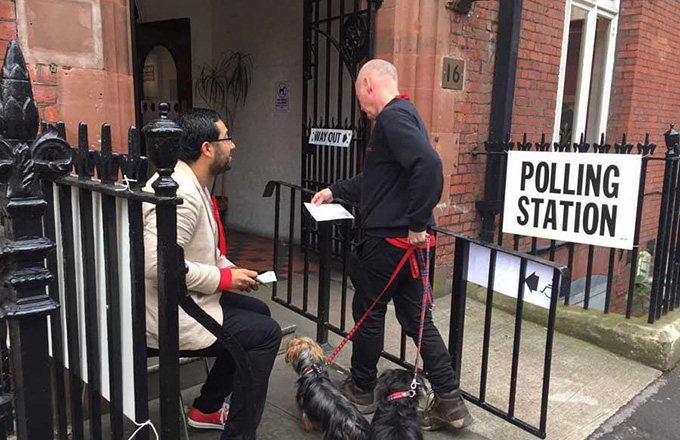Britain's general election: a gamble too far for Prime Minister May
LONDON - As British Prime Minister Theresa May gambled her political future on calling a snap general election seven weeks ago, results from Thursday's election show that her party can not form a majority government.
With 647 out of 650 seats declared, the Conservatives won 316 seats, but failed to hit the 326-seat threshhold for majority. Labour won 261 seats.
If the Conservatives eventually have to forge a coalition government, which will bring more uncertainties to British politics, they can still rely on the support of Ulster Unionists party of Northern Ireland, which is projected to win eight seats.
Experts said exit polls gave a strong indication that the election is a significant blow for May as losing the majority will inevitably reduce her authority in a future government. There are calls for her to step down.
Patrick Dunleavy, professor of politics at the London School of Economics (LSE) said Friday morning he didn't anticipate the actual results of the election to be "strikingly different" from what the exit poll suggested, adding, however, it is unlikely that May will either resign or be deposed as Conservative party leader amid ongoing Brexit process.
If May does quit Number 10 Downing Street, her 11-month tenure as prime minister would be the shortest in Britain in almost a century.
"I would think it is very unlikely. Most British prime ministers' careers end in disaster, but this is very quick and I don't think May is a give-up type of person," he said.
Tony Travers, another professor of politics at LSE, said the question now is how long May would last, and how long it will be until the next general election. No votes were scheduled until 2020 before May unexpectedly called a snap election.
May's original intention was to increase the 330-seat majority she inherited from predecessor David Cameron to gain a stronger mandate in fierce Brexit bargaining with the European Union.
Instead, the results of the election have seen the opposition Labour party gain strength, producing a "hung parliament" and making May a weaker prime minister.
A hung parliament will make the process of Britain leaving the EU more unpredictable as negotiations cannot be carried out single-handedly by the Conservatives but requires consultations with other parties.
The Conservatives will have to consult with Labour party in particular, which backs Brexit with a softer stance but as of now still lacks a detailed negotiating plan.
Furthermore, since May will have less of a say in Brexit, experts suggest that she might even face opposition within her own party.
"It's a complex challenge for her to appear tough with the remaining authority she had, but she would find parts of her own party rebelling," Travers said.
Markets reacted immediately to the exit poll with the pound was down 1.6 percent to 1.27 US dollars, slightly gaining ground after sliding to as low as 1.26 dollars.
Samuel Tombs, chief economist with Pantheon Macroeconomics, predicted a further fall of the sterling in the case of a hung parliament. On Brexit, he expected a "hard Brexit" to be more possible.
"With Brexit negotiations expected to begin formally on June 19, markets rightly will be worried that hardline Eurosceptics will retain leverage over the prime minister's negotiating hand, increasing the risk of a very hard Brexit," he said.
Tombs adds that the erosion of Conservative seats in the parliament will make it harder for the party to push forward its fiscal tightening plans, which, according to Tombs, include a rise in income taxes for high-income earners and reductions in state pensions.






















